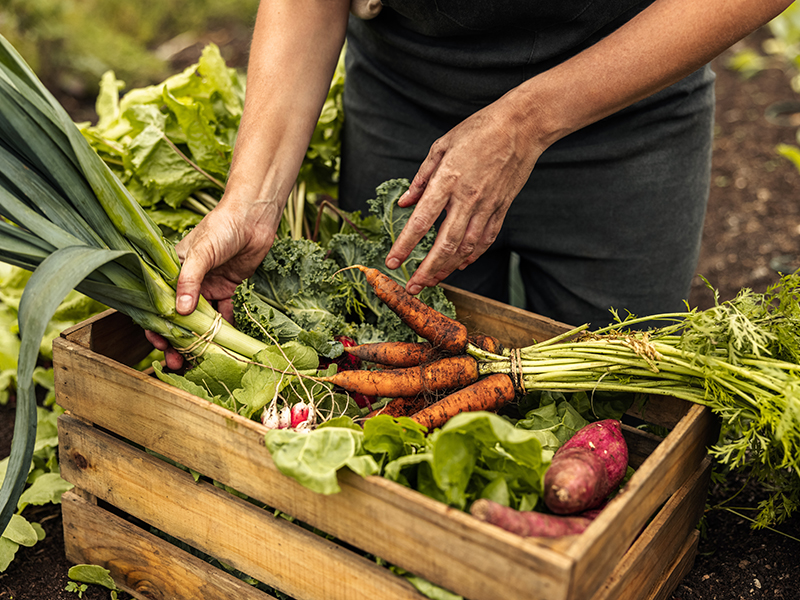The Injustice of the Unhoused
Garden Variety

A Seminarian’s Reflection
By Meg Kelly
I love homegrown produce. There is nothing like spending time in the garden weeding, watering, and watching your own food grow. The reward that comes from biting into a tomato in the middle of July, right after you picked it off the vine, is truly one of the finer things in life. As a kid, I watched my mom grow varieties of tomatoes, corn, okra, and squash, among other things. The garden that grew in our back yard was such an important part of our spring, summer, and fall; we spent so much of our time in it. But not everyone has the resources to grow their own food.
Churches can change that. The church I attended while growing up had a garden that used to give produce to the local soup kitchen. The church I serve now also has a garden that grows food for the sole purpose of donating to families in need. Churches often have space that they can use to grow food, whether in raised beds or tilled-out plots of land on their property. If every church planted just one raised bed, they could feed several families. We need to work with our churches to create these oases in the middle of the food deserts that haunt every county of every state throughout our nation.
Environmental justice is the fair treatment and meaningful involvement of all people, regardless of race, color, national origin, or income, with respect to the development, implementation, and enforcement of environmental laws, regulations, and policies.[1] Things like healthy food, clean air, clean water, and sustainable practices are things that should be considered both basic human needs and rights. Everyone has the right to breathe air that is not toxic and drink water that is not dirty and have access to food. While all human beings have that right, we know that it is not always the case. Whole communities—especially communities with lower incomes—are struggling with access to those basic rights.
I live in the middle of a food desert that also happens to be the seventh-largest food desert in the nation.[2] A food desert is an area where 33% of the population lives more than a mile from a grocery store or supermarket. I live in the heart of downtown Winston-Salem, and my closest grocery store is exactly one mile from my apartment; the second-closest grocery store is two miles away. The population of Forsyth County is 382,590, and knowing that roughly 33% of that population lives in a food desert, then that means that 126,254 people in this county alone live at least one mile away from a grocery store.
Food insecurity has been and continues to be a growing concern for many people. This is one of those things that we have to do something about. I recently got connected with the Piedmont Environmental Alliance (PEA), and the work they strive to do “educates and empowers, builds community, and inspires action to create a healthier, more economically vibrant and environmentally sustainable community.”[3] Environmental education is such an important part of their day-to-day. They work with schools, local businesses, and families to provide resources that educate, build community, and advocate for the environment.
One of their larger and ongoing practices helps people donate the extra food from personal gardens as well as from local community gardens to families in Winston-Salem that are facing food insecurity. Their data shows that in 2021, 669 pounds of produce was donated. As of the start of this garden season, they have successfully partnered with seven different community gardens where people can volunteer in the gardens and then the produce is donated to the PEA, which works alongside HOPE Winston-Salem to deliver the fresh produce to families in need. They also work to educate individuals on how to grow their own food and help them get the resources they need in order to do so. The PEA works hard to empower people in this community by helping them grow their own food and giving them access to freshly grown produce from local gardens.
Having food is a basic human right, whether that is having access to a grocery store or having the opportunity to grow your own food. When we make sure that all people are fed, we are making sure to participate in creating and maintaining a just system. Throughout the gospel, Jesus often shared meals with his disciples and those who gathered around him. When he taught, he taught the importance of caring for the poor and the marginalized. Sometimes that work looks like making sure our brothers and our sisters are fed.
You can participate in that work, too. If you are growing a garden this year, look in your community to see where some of your extra produce can go. Or, the next time you attend church, look and see if there is a garden there. If there is not, find out where you can put one, even if it is small. If you need help, I will come help you.
[3] About Us | Piedmont Environmental Alliance (peanc.org)
Meg Kelly is a third year M.Div. Student at Union Presbyterian Seminary in Charlotte and serves full-time at Parkway Presbyterian Church in Winston-Salem, North Carolina. She is a Candidate for the Office of Minister of Word and Sacrament in the Salem Presbytery. In her free time, she enjoys hanging out with her fiancé Sam, playing with her dog and spending as much time as possible outside.








